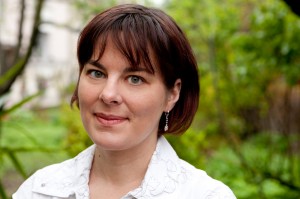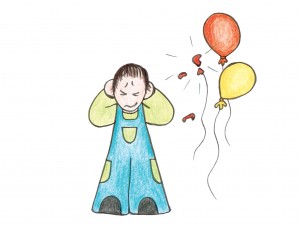 Alenka Klemenc is a psychologist and parent of a child with an Autism Spectrum Disorder. Alenka explains how she adjusted to parenting a child with ASD, including the benefits of receiving a supportive diagnosis.
Alenka Klemenc is a psychologist and parent of a child with an Autism Spectrum Disorder. Alenka explains how she adjusted to parenting a child with ASD, including the benefits of receiving a supportive diagnosis.
Since his birth, I began to notice that my child was different from the other children. My husband and I had great difficulties in attempting to create a rhythm of feeding and sleeping. He was crying a great deal and it seemed that everything disturbed him. He was often restless and gave the impression of being anxious; it was very difficult to comfort him. Even in his first year, he was very disturbed by physical stimuli, particularly sounds. He also rejected people and physical contact. I remember constantly being in search of an excuse, when somebody wanted to take a peek in the stroller or attempted to talk with him. His most common response was to burst into tears and turn away. I, a young mom, hastened with “Sorry, he just woke up,” or “Sorry, he’s not feeling well,” which was, of course, not true.
Most of the time, I felt like a complete failure as a mother. Our days were filled with effort upon effort, uneasiness and exhaustion. I simply could not establish a harmonious relationship with my child no matter what I did; there was always something wrong. Wherever we went and whatever we did, our outings, visits and activities constantly ended in tears and restlessness, which I was unable to understand at the time.
As a toddler, he was more interested in the physical world around him than in other children and people in general; he would be taken with stones, water pipes, running water. Entering nursery was arduous and long; he rejected it very openly. After a while, when she got to know my son better, a carer in the nursery once remarked, “Your son is, well, somewhat different”. She was very careful in choosing words that would not offend me. I, on the other hand, felt great relief in that finally someone from the outside confirmed what I had been suspecting for some time.
When he was about three, his love for the routine and rituals became very apparent. He wanted everything to be the same every day, in the same order and in the same manner. Whenever there was a change (for example, putting on his trousers first and then the T-shirt instead of the usual T-shirt-first-trousers-second routine), there would be no end to his crying and screaming. We had to undress, put the pyjama back on and start from the beginning; otherwise it was a ‘mistake’ in his mind. Sometimes I knew where the ‘mistake’ occurred, but very often I did not. We would be walking down the street and, all of a sudden, he would start screaming “Wrong, wrong!” I was clueless as to what was wrong. When this happened, we sometimes retraced our steps to the point when the mistake occurred and then continued, but sometimes there was simply no time for this. In those instances, the crying and screaming went on and on. He would cry for several hours, which was utterly exhausting for both me and my husband.
At every stage of his life, my son had certain activities or objects in which he took a consuming interest (water, level-crossing barriers, tunnels). He could watch or talk about them for hours on end. In the level-crossing barrier period, for example, he knew every level-crossing barrier in our vicinity, talked about them to the exclusion of everything else, regardless of whether other people were interested or not. He had a great difficulty in picking up on when his talking became excessive; he was very loud and dominant. He also generally preferred adult company to that of his peers; he always found children uninteresting and unpredictable.
When he was five years old and still not properly adapted to the child care centre and his peers, I began realizing that we needed to find a specialist who could help us. My husband and I did have a rudimentary knowledge of the autism spectrum disorders, but we still had many questions and worries. Our son was about to start school and we wanted it to be a sort of a new beginning for him, but also for us. We wanted him to be properly diagnosed and, through that, be able to properly adapt and be adapted to. We also wished that the adaptations would not be regarded as whims of over-protective parents (as we had heard so many times), but rather as recommendations, of an expert, as to how we could help the child in the most effective way, but also help ourselves to lead a more peaceful life.
The diagnostic process was a process of relief. It was, on the other hand, also a very emotionally taxing time, because we had to face the finality of our child having an autism spectrum disorder that would stay with him, in one form or another, for the rest of his life. We were seeing a special education worker until he entered school, after which my son was officially diagnosed, while my husband and I were equipped with skills for raising such a child as well as skills for taking care and protecting ourselves from constant exhaustion.
The period before school was for me also a time of a deep and gradual internal process. As a young mom, I naturally longed to connect with my child, to be able to calm his anxiety and help him connect with the world around him. I patiently tried to help him not reject physical contact, with my body and emotions I tried to understand the source of his anxiety, maintained contact with him even when his distress seemed almost intolerable. All this effort exhausted me to the point of falling ill. But it was this effort as well as my deep love of my child that allowed me to inch my way towards a better understanding of him, towards an understanding ‘from within’. When the diagnosis was established and before I fell ill, I felt the need to put the child’s inner world that I carried within me in writing. It took me no more than two hours to describe, from the point of view of the child, how he experienced the world, how he felt and thought and how we, the adults, could help him.
The text was initially meant for his first-grade teacher, to help her to better understand, accept, care for and help my son. When it fell into the hands of some of my friends and fellow psychologists, and inspired a friend to draw illustrations to it, however, suggestions were soon made for the text to reach an audience wider than the first-grade teacher. I finally decided to publish it in a book.
The long years of efforts p aid off in my family and the school really did bring about a new beginning. My son entered a school that takes his particularities seriously and puts great effort into accepting him. As a consequence, he began taking an interest in his classmates, taking part in their games and activities, he gradually learned to defend himself from the disturbing stimuli and to accept that things in life change rather than follow the same course every day. In school he is monitored by a special education worker and his progress is immense. It is best visible in our life as a family, which has become much calmer and relaxed; it even happens that he calms or entertains his younger brothers. He has fewer fears, he developed a special sense of humour and his great wish is to become a physicist.
aid off in my family and the school really did bring about a new beginning. My son entered a school that takes his particularities seriously and puts great effort into accepting him. As a consequence, he began taking an interest in his classmates, taking part in their games and activities, he gradually learned to defend himself from the disturbing stimuli and to accept that things in life change rather than follow the same course every day. In school he is monitored by a special education worker and his progress is immense. It is best visible in our life as a family, which has become much calmer and relaxed; it even happens that he calms or entertains his younger brothers. He has fewer fears, he developed a special sense of humour and his great wish is to become a physicist.
It is often said that children with autism spectrum disorders are unfeeling and that their interior is empty or incomprehensible, but this is not true. It is simply harder to find the key to their interior and harder to persist at their side. They can learn a great deal and, provided with a steady support, they can come to have a good understanding of the world around them and be able to share in the diversity of relationships. Step by step and success by success, they become more and more confident and creative, and see themselves as interesting, accepted and loved.
Alenka Klemenc is the author of What Is It Like To Be Me? 2013 published by Jessica Kingsley Publishers.
Thank you very much for this post. Very informative, supportive and loving information.
Dear Alenka, Words cannot express how grateful I am to you for your book. Our daughter was diagnosed a month ago, and in reading your book, my husband recognised his own ASD. We are struggling to find help in English in Vienna, Austria, but are already encouraged that with love and understanding, we will be able to help her deal with the challenges she faces. Thank you so much, and please let me know if there will soon be a French version available…this book would be invaluable to enhancing understanding in the francophone world, and helping so many more families.